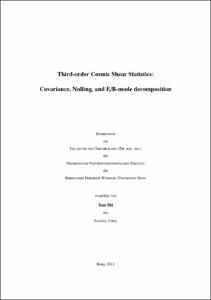Shi, Xun: Third-order Cosmic Shear Statistics : Covariance, Nulling, and E/B-mode decomposition. - Bonn, 2012. - Dissertation, Rheinische Friedrich-Wilhelms-Universität Bonn.
Online-Ausgabe in bonndoc: https://nbn-resolving.org/urn:nbn:de:hbz:5n-26164
Online-Ausgabe in bonndoc: https://nbn-resolving.org/urn:nbn:de:hbz:5n-26164
@phdthesis{handle:20.500.11811/5257,
urn: https://nbn-resolving.org/urn:nbn:de:hbz:5n-26164,
author = {{Xun Shi}},
title = {Third-order Cosmic Shear Statistics : Covariance, Nulling, and E/B-mode decomposition},
school = {Rheinische Friedrich-Wilhelms-Universität Bonn},
year = 2012,
month = feb,
note = {Weak gravitational lensing has emerged in the last decade as a competitive cosmological probe to observationally constrain the properties of dark energy, probably the one with the most statistical power when the results of forthcoming large-field imaging surveys are available. In this thesis we investigate weak lensing third-order statistics, a statistical tool which will be applied to future surveys to further enhance the power of weak lensing. Our investigations center on three aspects of weak lensing third-order statistics, namely how the observable shear can be related to theoretical predictions of the matter density field, how much information third-order statistics can provide, and how systematical errors can be controlled. A rigorous derivation of the form of bispectrum covariance is given. The nulling technique, a method to control the intrinsic-shear alignment systematics, has been generalized to the third-order statistics. The relations between third-order shear observables and the configuration space statistics of the underlying matter density field are established, and conditions for E/B-mode decomposition are found for third-order shear statistics.},
url = {https://hdl.handle.net/20.500.11811/5257}
}
urn: https://nbn-resolving.org/urn:nbn:de:hbz:5n-26164,
author = {{Xun Shi}},
title = {Third-order Cosmic Shear Statistics : Covariance, Nulling, and E/B-mode decomposition},
school = {Rheinische Friedrich-Wilhelms-Universität Bonn},
year = 2012,
month = feb,
note = {Weak gravitational lensing has emerged in the last decade as a competitive cosmological probe to observationally constrain the properties of dark energy, probably the one with the most statistical power when the results of forthcoming large-field imaging surveys are available. In this thesis we investigate weak lensing third-order statistics, a statistical tool which will be applied to future surveys to further enhance the power of weak lensing. Our investigations center on three aspects of weak lensing third-order statistics, namely how the observable shear can be related to theoretical predictions of the matter density field, how much information third-order statistics can provide, and how systematical errors can be controlled. A rigorous derivation of the form of bispectrum covariance is given. The nulling technique, a method to control the intrinsic-shear alignment systematics, has been generalized to the third-order statistics. The relations between third-order shear observables and the configuration space statistics of the underlying matter density field are established, and conditions for E/B-mode decomposition are found for third-order shear statistics.},
url = {https://hdl.handle.net/20.500.11811/5257}
}






